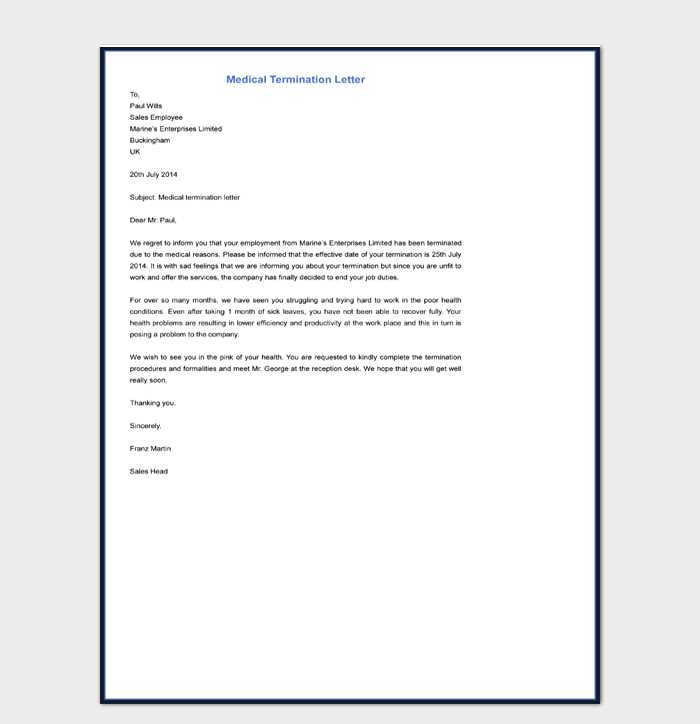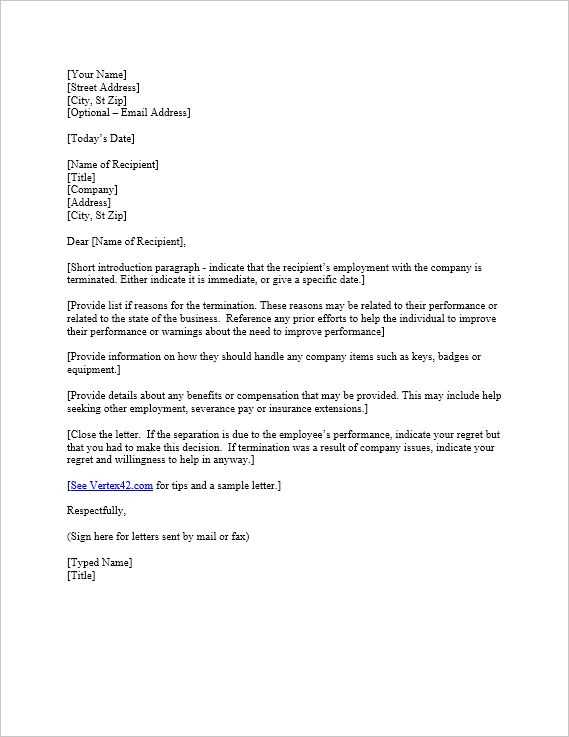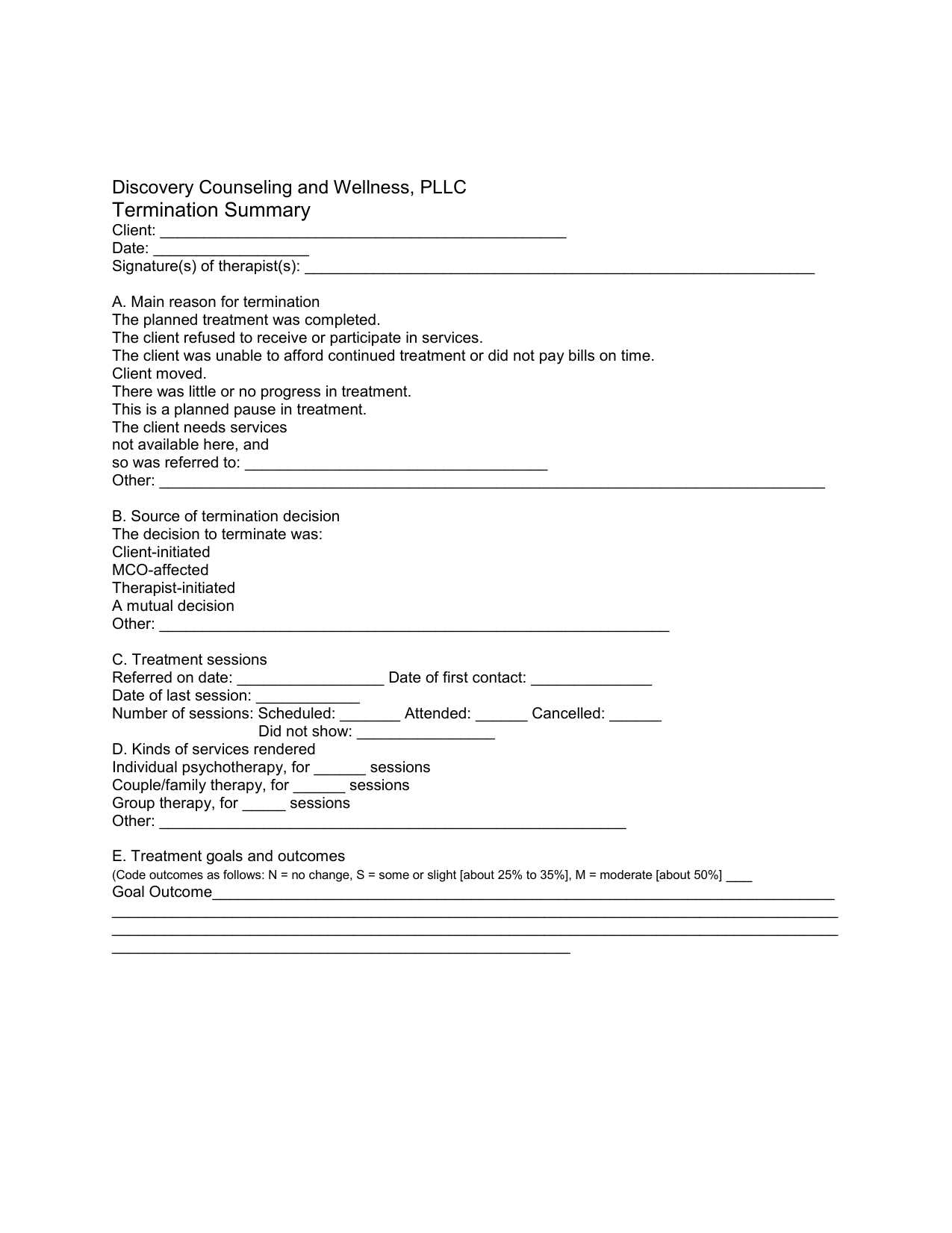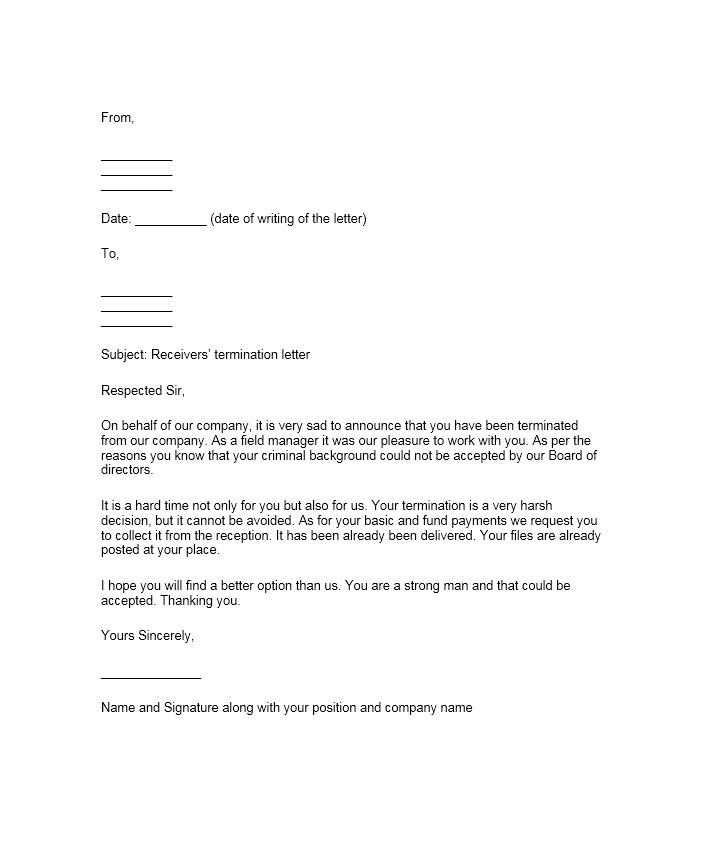Psychotherapy termination letter template

When the decision to terminate therapy is made, a clear and respectful letter ensures the process is handled professionally and with care. This letter should express appreciation for the therapeutic relationship while outlining the reasons for ending the sessions. Keep it concise, warm, and specific to avoid confusion or emotional discomfort.
Structure the letter clearly by starting with a formal greeting and acknowledging the progress made during the therapy sessions. Acknowledge the client’s efforts and commitment, reinforcing the positive aspects of the work done together.
Provide a brief, straightforward explanation of why the termination is taking place. This might involve a natural end to the therapy, the client reaching their goals, or another external factor. While it’s important to explain the reasoning, avoid unnecessary details that might cause confusion or discomfort.
Offer support for any future questions or concerns. It can be helpful to include information about resources or next steps if the client feels the need for ongoing support or another form of therapy. Keep the tone warm, emphasizing that the decision is in the best interest of the client’s personal growth and well-being.
End the letter with an encouraging and positive note, wishing the client well in their future endeavors. Keep the closing simple, offering openness to future contact if needed.
Psychotherapy Termination Letter Template

Clearly express the termination of psychotherapy services by stating the date of the last session. Provide a brief explanation for the decision, ensuring it is clear and respectful. Include any relevant logistical details such as referrals for future support if necessary.
Sample Template
Dear [Client’s Name],
I am writing to confirm the conclusion of our therapeutic work together, effective [Date]. Over the course of our sessions, you have made notable progress in addressing [specific goals, issues, or challenges]. I feel that you have acquired the tools needed to continue your personal growth independently.
If you feel the need for further support, I would be happy to refer you to a colleague or other services that may be helpful. Please don’t hesitate to reach out if you have questions or need additional information.
Thank you for the opportunity to work with you. I wish you the best moving forward.
Sincerely,
[Your Name]
[Your Title/Professional Designation]
[Contact Information]
How to Start Your Termination Letter Professionally

Begin with a clear and respectful statement of intent. A direct but courteous opening sets the right tone for the letter. For example, you might say, “I am writing to formally conclude our therapeutic relationship, effective as of [date].” This straightforward approach shows professionalism and avoids unnecessary ambiguity.
Address the therapist by their proper title and full name to maintain a formal tone. This simple gesture shows respect for their role and expertise. You may choose to use “Dear [Therapist’s Name],” as your salutation to start the letter appropriately.
Express gratitude briefly but sincerely. Acknowledge the help and support received during therapy, making it clear that your decision is based on personal reasons or specific needs, rather than dissatisfaction with the therapist’s services. For example, “I want to thank you for the guidance and support provided during our sessions.” This maintains a positive relationship and shows your appreciation for their work.
Clarifying the Reason for Ending Therapy
State the exact reason for ending therapy clearly and directly. If it’s due to personal choice, specify that your decision is based on reaching your goals or feeling equipped with the tools learned during sessions. Be honest about whether external factors, such as schedule conflicts or changes in financial circumstances, contributed to the decision. Acknowledge if progress has been made and express appreciation for the support received throughout the process. This transparency ensures that both parties understand the context, allowing for a respectful and professional closure.
If there are unresolved issues or a mismatch in therapeutic approach, it’s helpful to mention this respectfully. Acknowledge the therapist’s efforts while communicating the specific aspects that no longer align with your needs. This can prevent misunderstandings and leaves room for growth in future therapeutic relationships.
Expressing Gratitude for the Client’s Effort
When writing a psychotherapy termination letter, acknowledging the client’s commitment to their growth and progress is key. It’s important to highlight the effort they put into the therapeutic process. Directly express appreciation for their hard work and the steps they took, even during difficult moments. This acknowledgment reinforces their personal growth and provides a sense of closure and encouragement for future endeavors.
Specific Examples of Effort

Point out the specific actions the client took that contributed to their progress. Whether it was confronting challenging emotions, trying new coping strategies, or engaging in difficult conversations, acknowledging these efforts shows respect for the work they’ve done. Highlighting the specific moments where the client faced challenges and made choices toward change encourages them to continue their journey of self-improvement.
Personalized Appreciation
Use language that reflects the client’s unique path. This could include thanking them for their openness, trust, and willingness to explore difficult topics. Personalizing the gratitude emphasizes their individual contributions to the therapeutic process and helps maintain the relationship on a positive note.
| Client’s Effort | Suggested Acknowledgment |
|---|---|
| Consistent participation in sessions | “I truly appreciate your commitment to attending every session and engaging fully in the process.” |
| Openness to new strategies | “Your willingness to try new approaches and techniques shows your dedication to making positive changes.” |
| Handling difficult conversations | “It took courage to address such difficult topics, and I respect the effort you’ve shown in doing so.” |
Explaining Future Options for Support or Referrals
If clients need additional support after therapy concludes, it’s helpful to provide them with specific options. Let them know they can reach out to another mental health professional if they feel the need for continued care.
Therapy Options
- Contact another therapist who specializes in a particular area that aligns with the client’s needs, such as anxiety, depression, or trauma.
- Consider group therapy for those seeking shared experiences and peer support.
- If suitable, recommend online counseling platforms for flexibility and convenience.
Additional Resources
- Support groups that focus on specific issues, such as grief or addiction.
- Community programs offering free or low-cost mental health services.
- Helplines and crisis hotlines available for immediate emotional support.
Encouraging clients to reach out to these resources can help them transition smoothly after therapy. Providing them with a few contact details, websites, or phone numbers makes it easier for them to take the next step in seeking support.
Addressing Emotional Reactions to Termination

Clients often experience a mix of emotions as therapy ends. These feelings can range from relief to sadness or even anger. It’s important to acknowledge these reactions as part of the process. Acknowledge the emotional response without judgment, allowing space for the client to express themselves freely.
Validation is key. Let the client know their feelings are natural and expected. This can help them feel heard and understood, reducing any anxiety about the end of therapy. Reassure them that it’s normal to feel a sense of loss or uncertainty when concluding a therapeutic relationship.
Revisit progress made throughout the sessions. Remind the client of the tools and skills they’ve gained, emphasizing how they can apply these in future situations. Reflecting on progress helps shift focus from the ending to the positive changes achieved during the course of therapy.
Offer closure by discussing the termination process openly. This allows the client to express any final thoughts or concerns. If applicable, suggest resources or referrals for ongoing support. Clients may feel more secure knowing they have a plan moving forward.
Allow space for grief. For some, the end of therapy can evoke feelings similar to losing a trusted companion. Acknowledge that this feeling may arise and give clients permission to experience it fully without the pressure to “move on” immediately.
End the session with appreciation. Thank the client for their trust and participation, reinforcing the positive impact of the therapeutic relationship. This final gesture helps cement a sense of accomplishment and mutual respect as therapy concludes.
Providing Closure and Well-Wishes
Conclude your letter by expressing sincere appreciation for the time spent working together. Acknowledge the client’s efforts and progress, and highlight their strengths. This approach helps to leave the relationship on a positive note.
Express Gratitude
Thank the client for their trust and openness throughout the sessions. Let them know that their hard work and commitment were noticed and valued. Acknowledge any specific accomplishments that stand out.
Offer Encouragement
Reassure them that the skills they’ve developed will continue to benefit them. Offer a few words of encouragement, reminding them of their capacity for growth. Suggest ways to maintain progress, whether through self-care, support networks, or future therapy if needed.
Well-Wishes
Conclude with well-wishes for their future endeavors. Express hope for their continued personal growth, well-being, and happiness. A positive and supportive tone will leave them with a sense of confidence as they move forward.